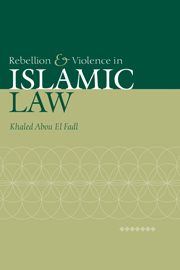Book contents
- Frontmatter
- Contents
- Preface and acknowledgments
- Introduction
- 1 Modern scholarship and reorienting the approach to rebellion
- 2 The doctrinal foundations of the laws of rebellion
- 3 The historical context and the creative response
- 4 The rise of the juristic discourse on rebellion: fragmentation
- 5 The spread of the Islamic law of rebellion from the fourth/tenth to the fifth/eleventh centuries
- 6 Rebellion, insurgency, and brigandage: the developed positions and the emergence of trends
- 7 The developed non-Sunnī positions
- 8 Negotiating rebellion in Islamic law
- Works cited
- Index of names
- Index of subjects
4 - The rise of the juristic discourse on rebellion: fragmentation
Published online by Cambridge University Press: 15 December 2009
- Frontmatter
- Contents
- Preface and acknowledgments
- Introduction
- 1 Modern scholarship and reorienting the approach to rebellion
- 2 The doctrinal foundations of the laws of rebellion
- 3 The historical context and the creative response
- 4 The rise of the juristic discourse on rebellion: fragmentation
- 5 The spread of the Islamic law of rebellion from the fourth/tenth to the fifth/eleventh centuries
- 6 Rebellion, insurgency, and brigandage: the developed positions and the emergence of trends
- 7 The developed non-Sunnī positions
- 8 Negotiating rebellion in Islamic law
- Works cited
- Index of names
- Index of subjects
Summary
TERROR AND THE JURIDICAL RESPONSE
In the first two centuries of Islam, the jurists witnessed numerous occasions where Muslims fought each other. While it would be inaccurate to assert that the Umayyads or the early cAbbāsids were considered illegitimate, there were several rebellions that attracted the sympathy or participation of some of the most notable jurists. Nonetheless, the issue of rebellion could not be approached dogmatically. It was not a simple matter of declaring one party good and the other evil. Jurists had to live and work within the emerging institutions of society. Furthermore, rebellions, which often elicited cruel and swift vengeance by the caliphs, served as reminders of the evils of fitan, and also of the ability of the rulers to apply raw power and force when they deemed it necessary. This was taking place at a time when the corporate and institutional identity of the jurists was developing. Of course, the caliphs claimed the power of the sword and God to their side. But jurists wished to claim the power of legality to their own side. They, in other words, would become the authoritative bearers of lawfulness – the lawful invocation of the sword and God.
The miḥna was symptomatic of this process. In a sense, whether the jurists won the battle of the inquisition or not depends on how one looks at the matter. In the short term the vast majority gave in to the caliph's demands and admitted whatever the caliph wanted.
- Type
- Chapter
- Information
- Rebellion and Violence in Islamic Law , pp. 100 - 161Publisher: Cambridge University PressPrint publication year: 2001



